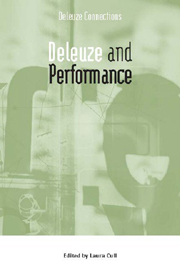Book contents
- Frontmatter
- Contents
- Introduction
- 1 Performing in the Chaosmos: Farts, Follicles, Mathematics and Delirium in Deleuze
- Act I Deleuze on Theatre: Artaud, Beckett and Carmelo Bene
- Interval
- Act II Confronting Deleuze and Live Performance
- Interval
- Act III A Digital Deleuze: Performance and New Media
- Notes on Contributors
- Index
1 - Performing in the Chaosmos: Farts, Follicles, Mathematics and Delirium in Deleuze
Published online by Cambridge University Press: 12 September 2012
- Frontmatter
- Contents
- Introduction
- 1 Performing in the Chaosmos: Farts, Follicles, Mathematics and Delirium in Deleuze
- Act I Deleuze on Theatre: Artaud, Beckett and Carmelo Bene
- Interval
- Act II Confronting Deleuze and Live Performance
- Interval
- Act III A Digital Deleuze: Performance and New Media
- Notes on Contributors
- Index
Summary
Let's begin with the basics: ‘It breathes, it heats, it eats. It shits and fucks.’ Sounds like the body, which in a conventional theatre may have no trouble breathing or eating, or in various ways heating up, under the weight of a period costume, or angrily, passionately, or more or less imperceptibly, as in a staged embrace. But shitting and fucking, well, except in way-out kinds of performance, or scandalous body art, it's more likely to be represented, and where shitting is concerned, even more so than fucking, it's going to be in the wings, and even muted there, that is, the farting and plopping. Back in the theatre of ancient Rome, where unsuspecting actors were actually crucified, and sexual intercourse performed without faking it – in festive diversions from the comedies of Terence – it may have been right out there in the open, even elimination, the body or its waste. But now, whether we see it, whether we don't, what we may think of as a natural ‘function’ is not that at all, or so we're told in the Anti-Oedipus by Deleuze and Guattari: wherever we do it, whatever it is, even the eating or shitting is everywhere machines, ‘real ones, not figurative ones’ (and nothing like ‘the id’, that egregious mistake of Freud), machines driving machines, however coupled, however connected, or spilling out of the sac, one producing a flow, menstrual, sperm, urine, that the other interrupts, ‘an organ-machine … plugged into an energy-source-machine’.
- Type
- Chapter
- Information
- Deleuze and Performance , pp. 22 - 34Publisher: Edinburgh University PressPrint publication year: 2009



